#Private Apps on Shopify
Explore tagged Tumblr posts
Text
Enable Private Apps on Shopify Without Compromising Data Security
Learn how to enable private apps on Shopify while keeping your data safe. This blog provides simple steps and key practices to maintain strong security when integrating private apps.
From understanding permissions to managing sensitive data, it covers everything you need to protect your store and customer information. A must-read for businesses looking to safely add functionality to their Shopify store without risking security.
0 notes
Text
Failure to Implement Proper Security in Shopify Private App Development?

Are you experiencing a failure to implement proper security in your Shopify Private App Development, resulting in data breaches, vulnerabilities, and compromised client information? Secure your Private App by partnering with our team of Shopify App Developers, who have many years of experience in following best practices for private data protection, authentication, and secure API usage. Are you interested in hiring us?
1 note
·
View note
Text
Enhance Your Store's Capabilities with Superior Shopify Private App Development
Unlock new possibilities and elevate your online store with our premium Shopify private app development services. Seamlessly enhance your store's functionality, boost customer engagement, and streamline operations with our expertly crafted apps. Discover a world of limitless opportunities today.
0 notes
Text

Unlocking FedEx Home Delivery: A Definitive Manual for WooCommerce & Shopify Users
Efficient shipping solutions are vital for e-commerce success, with FedEx Home Delivery standing out for residential deliveries in the US. For WooCommerce and Shopify users, understanding FedEx Home Delivery surcharges is crucial. This guide explores the nuances of these surcharges, comparing residential and commercial rates, and offers actionable insights for merchants.
Understanding FedEx Home Delivery Surcharge: FedEx Home Delivery relies on FedEx Ground's infrastructure but varies significantly in cost, especially for residential deliveries.
Why Use FedEx Home Delivery?
It's ideal for shipping heavier items to residential addresses without commercial amenities. Despite higher surcharges, it's cost-effective for specific customer demographics.
Comparing Costs: FedEx Express and FedEx Ground have raised commercial surcharges, while FedEx Home Delivery's residential surcharge stands at $3.80 per package.
Identifying Residential Addresses: Residential surcharges apply to shipments to homes or private residences within the US.
Integration with WooCommerce & Shopify: Choose plugins or apps that accurately calculate shipping costs, including residential surcharges.
Optimizing Shipping: Batch processing, address verification, and negotiating rates can mitigate surcharge impacts.
By following this comprehensive guide, WooCommerce and Shopify users can unlock the full potential of FedEx Home Delivery, empowering them to deliver exceptional service and exceed customer expectations in their online ventures. Conclusion: Grasping the nuances of FedEx Home Delivery surcharges is paramount for streamlined e-commerce operations.
2 notes
·
View notes
Text
How effective to work with Custom Shopify Application Developers in Chandigarh?
In this technical era, Shopify is one of the most popular e-commerce platforms that allows businesses to create and manage their online stores in a smart way. Despite a lot of built-in features and functionalities in Shopify, many businesses require out of the box customizations that are not available. This is where custom Shopify application developers come into the action.
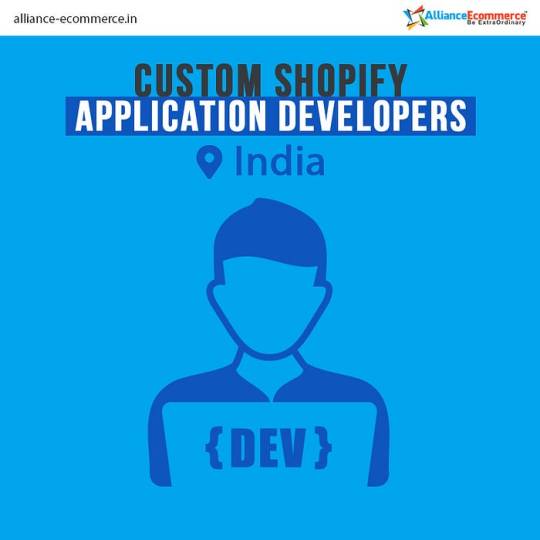
One of the key benefits of working with custom Shopify application developers in Chandigarh is that they can help businesses stand out from their competition. It offers unique and innovative features for businesses that can provide a better user experience and increase customer satisfaction.
Another benefit of custom Shopify application development is that it can help businesses save time and money. By automating certain processes or creating custom workflows, businesses can streamline their operations and reduce the need for manpower which can lead to significant cost savings in the long run.
Why Do We Need to Work with Shopify Experts?
However, developing custom Shopify applications is not a task that can be taken lightly. It requires expertise in the Shopify API, as well as knowledge of trending programming languages. This is why it’s important to work with experienced Shopify Experts in India like Alliance Ecommerce who have a proven track record of delivering high-quality solutions for Ecommerce businesses over the world.
Let’s take an overview of the Alliance Ecommerce services
Shopify Theme Design: To streamline the user experience by making online purchases as easy and efficiently as possible, Alliance Ecommerce offers interactive E-Commerce UX Designs and helps businesses to accomplish their long-term goals.
Shopify Development: Alliance Ecommerce has a proven track record of creating advanced and high-performing Shopify stores by offering the best Shopify Development services in Chandigarh and for top brands and retailers worldwide.
Shopify App Development: To extend the functionality of your business apps, Alliance Ecommerce has expertise in all kinds of public, private, and custom app development as per your requirements. Also, it provides a free demo and setup for each of our apps.
System Integrations: Moreover, Alliance also offers the Shopify System Integration process and ensures that the subsystems work well at all phases of system development.
Digital Marketing and Optimization: Rather than just focusing on development and designing, It aims to increase traffic, engagement, and conversions on a business’s website, ultimately leading to improved revenue and growth through data analysis, speed optimization, testing, and conversion optimization.
Conclusion: To conclude, working with custom Shopify application developers in Chandigarh offers numerous benefits for businesses looking to improve their online stores. All you need to hire the best Shopify experts to accomplish your business goals.
#Shopify System Integration#alliance#shopify themes#Alliance ecommerce#shopify experts in chandigarh#Custom Shopify Application Developers chandigarh#Shopify Application Development in India#Custom Shopify Application Developers in India#Shopify Experts Chandigarh#Shopify Plus Experts Chandigarh#Shopify Plus Experts in India#Shopify Experts in Chandigarh#Shopify Experts
3 notes
·
View notes
Text
AI Member - Create a Gamified Community That Auto-Grows & Pays You Daily

Do you want to build an online community that makes money every day? Imagine having a group where people join, stay active, and buy from you without extra work. AI Member is a new tool that helps you do this. It uses AI (Artificial Intelligence) to create and grow communities fast.
Many people try to build online groups, but they fail. Why? Because keeping people engaged is hard. AI Member solves this problem by adding gamification (fun and rewards) to your community. This means people stay active, invite others, and keep coming back.
Grab AI Meember With Coupon Code: AIM3OFF
What is an AI Member?
AI Member is a powerful AI-driven platform that helps you build, grow, and make money from an online community. It automates the hard work for you. This means you don’t need to:
Spend hours creating content
Pay for ads
Hire a marketing team
Worry about tech issues
AI Member makes everything easy and fast. You just pick a niche (like fitness, business, or gaming), and AI does the rest.
Key Features
AI-Powered Automation – AI creates and manages your community.
Gamification – Members earn points, badges, and rewards.
No Monthly Fees – Pay once and use forever.
Built-In Monetization – Sell courses, products, or memberships.
SEO & Engagement Boost – AI writes posts and replies for you.
Simple Setup – No coding or tech skills needed.
Now, let’s see how AI Member works.
Benefits of AI Member
AI Member App
The only app that allows you to build communities without you lifting a finger…
AI Content Generator
Without you writing a word or designing anything… AI will do all of that for you and fill your communities with engaging content and comments.
AI Gamification
You can add reward systems, leaderboards, and viral points with just a click without needing any third-party apps.
AI Member Generator
No ads, no marketing, no social spamming needed… AI Member will fill your communities with hundreds of paid members.
AI Community Engager
Preload your community with AI-generated posts, comments, and “members” so it looks instantly active. AI auto-replies to every new post with relevant, hype-building comments, keeping conversations exploding 24/7.
AI Course Creator
Type a keyword → AI builds a high-value course (videos, quizzes, workbooks) in minutes. Sell it for $997… or bundle it into memberships.
AI Member Drag ‘N Drop Editor
Without any experience or skills, start editing any website you want with just a few clicks.
Community Marketplace
Sell physical products & consultations. Turn your community into a buzzing marketplace—no extra apps are needed. Members see your offers → click → buy. No coding, no Shopify fees. Just instant profits from your own branded storefront.
Live Events & Webinars
Host sold-out virtual events inside your community. Give members front-row seats to exclusive workshops, Q&As, or coaching sessions—and charge premium access fees.
AI Blog
Keep members engaged & dominate search rankings with an AI-powered blog channel!
Live Chat & Private DMs
Members chat in real time, slide into DMs, and build relationships while you profit.
Video & Voice Message
Share viral videos directly in your community (no YouTube ads stealing your traffic).
AI Member Ultra-Fast Hosting
Host your website on our SSD hosting with blazing-fast speed—without paying anything monthly.
How AI Member Works
Using AI Member is very simple. You can create a community in three easy steps.
Step 1: Choose Your Niche
Pick a topic for your community. This could be:
Health & Fitness
Business & Marketing
Personal Finance
Gaming & Technology
Hobbies & Crafts
You don’t need to be an expert. AI will help you generate content and attract members.
Step 2: Customize Your Community
You can change how your community looks and works. AI Member gives you options like:
Adding a logo
Choosing colors and themes
Setting up rewards and badges
This makes your group look professional and exciting.
Step 3: Let AI Grow Your Community
Once your community is ready, AI takes over. It will:
Invite new members using viral marketing
Post content to keep the group active
Engage with members automatically
Sell products and services for you
You don’t need to do anything. Just watch your community grow and make money.
Why Gamification is Important
Most online communities fail because people lose interest. AI Member solves this by using gamification.
What is Gamification?
Gamification means adding fun and rewards to your community. People love games, and they stay active when they can earn points and win prizes.
AI Member’s Gamification Features
Leaderboards – Members compete to be the best.
Points System – People earn points for posting and inviting friends.
Badges & Rewards – Special badges make members feel special.
Referral System – Members get bonuses for bringing in new people.
This makes your community exciting and addictive. People will keep coming back and invite
How to Make Money with AI Member
AI Member is not just for fun. It helps you make real money in different ways.
1. Sell Memberships
Charge people to join your exclusive community. Offer premium content, training, or support.
2. Sell Digital Products
Sell courses, ebooks, templates, or guides directly in your community.
3. Offer Coaching & Services
If you are an expert, you can offer one-on-one coaching or consulting services.
4. Affiliate Marketing
Promote products and services and earn commissions for each sale.
5. Flip Your Community
Once your group grows, sell it for a high price. Many businesses pay thousands of dollars for a ready-made audience.
With AI Member, you don’t need to be a marketing expert. AI handles everything for you!
Setting Up AI Automation for Hands-Free Income
One of the best things about AI Member is that it runs on autopilot. Here’s how to set up AI automation for hands-free income:
AI-Generated Content
AI automatically creates blog posts, discussions, and comments.
This keeps your community fresh and active without extra work.
AI-Powered Engagement
AI replies to members, asks questions, and starts conversations.
This makes your community feel alive and welcoming.
AI-Driven Monetization
AI promotes your products, services, and affiliate links.
It can recommend courses, ebooks, and membership upgrades.
AI tracks sales and helps increase your revenue automatically.
With these tools, your community can grow and generate income 24/7 without effort.
Advanced Monetization Techniques
If you want to maximize your profits, here are some advanced ways to make money with AI Member:
1. High-Ticket Offers
Offer premium coaching programs or mastermind groups.
Charge $500 to $5000 per client for exclusive services.
2. Subscription Tiers
Have free and premium membership plans.
Offer VIP access with extra features and benefits.
3. Sponsored Content
Allow businesses to advertise inside your community.
Charge brands to post sponsored articles and promotions.
4. Sell AI-Generated Courses
AI can help create video courses, guides, and PDFs.
Sell them for passive income without extra work.
With these techniques, you can turn AI Member into a high-income machine.
Why You’ll Love AI Member
No Ads, No Content Creation – AI fills your community with content, videos, quizzes, posts, and more.
Auto-Grow Feature – AI invites new paying members automatically.
No Monthly Fees – Pay once and keep all your profits.
AI-Driven Engagement – AI auto-posts, replies, and keeps your group active 24/7.
Built-In Monetization – Sell courses, products, or memberships directly.
Flip Communities for Profit – Sell your community for $997+ per sale.
SEO Optimized – AI helps your community rank on Google.
Simple & Fast – Takes just 60 seconds to create a thriving community.
You’ll Get These 5 Bonuses To Turbocharge Your Success With AI Member
Bonus #1: Done-for-You Gamified Community Templates
Pre-designed templates for popular niches like fitness, business, parenting, and more. Each template includes pre-built threads, leaderboards, and engagement systems.
Bonus #2: AI Member Viral Growth Playbook
A step-by-step guide on using AI Member’s referral system to grow your community fast. Learn how to create viral offers and scale organically.
Bonus #3: AI Content Generator Pack
Access to 1,000+ pre-written AI prompts for threads, quizzes, and posts. Keep your community engaged with fresh content.
Bonus #4: AI Member Monetization Blueprint
A full guide on monetizing your community. Includes pricing strategies, sales funnels, and real-life examples.
Bonus #5: AI Member Agency Accelerator Pack
Resources for selling AI Member communities as a service. Includes:
Client pitch decks
Pricing calculators
Proposal templates
Agency branding kit
My Personal Experience with AI Member
I started using AI Member to build a business coaching community. Within 3 months, I:
Grew my community to over 5,000 members.
Earned $12,000 from digital products and coaching.
Spent less than 2 hours per week managing the group.
AI handled everything, from content creation to engagement and sales. This allowed me to focus on scaling my business without stress.
My Recommendation
If you want a passive income business, AI Member is a great choice. It’s easy to use, affordable and works in any niche. Whether you are a beginner or an expert, AI Member can help you:
Build a thriving online community.
Grow your influence and income.
Create a long-term passive income stream.
I highly recommend trying AI Member today! Grab AI Member With Coupon Code: AIM3OFF
With AI Member, You Can:
Reach 100% of your audience instantly—no SPAM filters, no bounces, no missing messages.
Engage members in real-time with interactive posts, discussions, and gamification that email simply can’t match.
Scale infinitely—without paying more for every new member who joins your community.
Turn followers into superfans—who promote your business, refer others, and spend more on your offers.
Automate content creation—AI generates posts, discussions, and responses to keep engagement high.
Monetize easily—sell courses, memberships, and digital products effortlessly inside your community.
Build authority in any niche—establish yourself as an expert with AI-curated high-value content.
Save time and money—no need to hire writers, marketers, or designers—AI does it all for you!
FAQ
1. Do I need technical skills?
No! AI Member is easy to use. You don’t need coding or marketing skills.
2. How fast can I start making money?
Some users start earning within weeks. It depends on your niche and effort.
3. Is there a monthly fee?
No, AI Member is a one-time payment.
4. Can I use it in any niche?
Yes! AI Member works for any topic or business.
Start building your AI-powered community today!
Grab AI Member With Coupon Code: AIM3OFF
#ai member ai memberreview#traffic#make money online#affiliate marketing#high ticket profit#passive income
0 notes
Text
Shopify App Development – Enhance Your E-Commerce Store with ECA Code
In today’s fast-paced digital world, having a powerful and customized Shopify store is essential for success. Whether you want to improve user experience, streamline operations, or boost sales, Shopify app development is the key to achieving these goals. ECA Code specializes in building high-quality Shopify apps that enhance functionality, automate tasks, and provide seamless integration with your store.
Why Invest in Shopify App Development?
A custom Shopify app can help businesses optimize their store’s performance and provide customers with a better shopping experience. Here’s why Shopify app development is essential:
Enhanced Store Functionality – Custom apps help add unique features like personalized recommendations, automated inventory management, and dynamic pricing.
Seamless Integration – A Shopify app can integrate with third-party tools such as payment gateways, marketing platforms, and CRM systems.
Improved Customer Engagement – Features like live chat, loyalty programs, and AI-powered chatbots enhance customer interaction and satisfaction.
Increased Sales & Conversions – Apps that improve user experience, such as one-click checkout or abandoned cart recovery, directly impact sales and revenue.
Efficient Store Management – Automate repetitive tasks such as order processing, email marketing, and inventory tracking to save time and resources.
ECA Code – Your Trusted Shopify App Development Partner
At ECA Code, we specialize in developing custom Shopify apps tailored to meet your business needs. Whether you require a public, private, or custom app, our expert developers ensure high-performance solutions that enhance your Shopify store.
Conclusion
Investing in Shopify app development is a game-changer for e-commerce businesses looking to improve efficiency and customer engagement. With ECA Code, you get innovative and scalable Shopify apps that transform your online store. Contact ECA Code today to create a customized Shopify app that takes your business to the next level!
Blog Source: https://sites.google.com/view/shopify-app-development-store/home
0 notes
Text
Best Shopify App Development Company in Gandevi
If you're looking for the Best Shopify App Development Company in Gandevi, you're in the right place. Shopify has become one of the leading e-commerce platforms, helping businesses set up and manage their online stores with ease. However, to fully maximize the potential of Shopify, you need a custom app that enhances the functionality of your store. In Gandevi, several companies specialize in Shopify app development, offering tailored solutions that suit your business needs.
Why Choose the Best Shopify App Development Company in Gandevi?
When selecting a Shopify app development company, it's essential to focus on experience, expertise, and the ability to deliver results. A reliable company can help you build custom Shopify apps that not only integrate seamlessly with your online store but also provide a smooth user experience, boosting your business's performance.
Expertise in Shopify App Development
A top-tier Shopify app development company should have deep knowledge of the Shopify platform. The best Shopify App Development Company in Gandevi possesses a team of experts who are well-versed in Shopify's Liquid programming language, APIs, and other essential tools required to develop highly functional and scalable apps. Their developers should be capable of creating both private and public apps, enabling you to extend Shopify's functionality and provide a personalized shopping experience to your customers.
Custom Solutions Tailored to Your Business
The Best Shopify App Development Company in Gandevi offers custom solutions designed to meet your unique business requirements. They understand that every business is different, and one-size-fits-all apps don't always deliver the best results. Whether you need an app to improve your store’s functionality, enhance customer experience, or integrate third-party services, the right company will offer tailored solutions that are built specifically for your needs.
Quality Assurance and Testing
Quality assurance and testing are crucial components of the app development process. The best companies in Gandevi ensure that every app is rigorously tested to identify bugs and performance issues before it goes live. They perform thorough testing across different devices and platforms to ensure the app works flawlessly and provides an excellent user experience.
Affordable and Transparent Pricing
One of the key factors to consider when selecting the best Shopify app development company in Gandevi is pricing. The company you choose should offer transparent pricing with no hidden charges. They should provide a clear breakdown of the cost involved, ensuring that you are not caught off guard by unexpected fees. The best companies understand the importance of delivering value for money while maintaining the highest quality standards.
Features to Look for in the Best Shopify App Development Company in Gandevi
When searching for the best Shopify app development company in Gandevi, there are several factors you should consider to ensure you make the right choice.
Experience and Reputation
The first thing to check is the company’s experience in developing Shopify apps. A company with years of experience will have a solid track record of successful app development projects. Additionally, look for client reviews and testimonials that can provide insight into the company’s reputation and ability to deliver on its promises.
Expertise in Shopify Integration
Shopify is a robust platform with various features and integrations. The Best Shopify App Development Company in Gandevi should be proficient in integrating third-party tools and services, such as payment gateways, marketing platforms, and shipping services, into your Shopify store. They should also have experience working with Shopify’s APIs to ensure smooth data exchange and enhanced functionality.
Mobile Optimization
In today’s digital world, mobile optimization is a must. Most shoppers now browse and shop on their mobile devices, so your Shopify app must be fully optimized for mobile users. The best Shopify app developers in Gandevi understand the importance of mobile optimization and ensure that the apps they create offer a seamless experience on all devices.
Post-Launch Support
Launching an app is just the beginning. After the app is live, you need ongoing support to ensure it continues to function correctly and adapts to any changes in your business. The best companies offer comprehensive post-launch support, helping you with bug fixes, updates, and any other issues that may arise.
Benefits of Working with the Best Shopify App Development Company in Gandevi
Partnering with the Best Shopify App Development Company in Gandevi offers several advantages for your business.
Improved User Experience
Custom apps are designed with your customers in mind. They can improve the user experience by offering unique features that make shopping easier and more enjoyable. Whether it's a personalized product recommendation engine, advanced search functionality, or a streamlined checkout process, the best apps enhance customer satisfaction, leading to higher conversion rates.
Increased Sales and Revenue
By enhancing the functionality of your Shopify store with a custom app, you can provide a more personalized shopping experience. This leads to increased customer loyalty, repeat business, and ultimately, higher sales and revenue. Additionally, well-developed apps can help streamline business operations, reducing costs and increasing profitability.
Seamless Integration with Your Shopify Store
The best Shopify apps integrate seamlessly with your store, allowing you to automate processes and improve efficiency. Whether it’s syncing inventory, managing orders, or handling customer data, custom apps ensure everything works together smoothly, saving you time and effort.
Scalability and Flexibility
As your business grows, your needs will change. The best Shopify app development companies create scalable and flexible apps that can grow with your business. Whether you need to add new features or expand your store’s functionality, the apps are designed to adapt and evolve, ensuring long-term success.
Conclusion
When looking for the Best Shopify App Development Company in Gandevi, it's important to find a company that understands your business goals and can deliver a custom solution that enhances your Shopify store’s performance. With the right partner, you can build a unique app that streamlines your operations, improves user experience, and boosts sales. By choosing a reputable and experienced company, you can ensure that your Shopify app is a valuable asset that helps your business thrive in the competitive online marketplace.
0 notes
Text
Shopify App Development Services
Developing unique apps that expand and improve Shopify shop functionality is part of the Shopify App Development Services offering. These services are designed to meet the specific needs of businesses using the Shopify platform, providing solutions beyond the built-in features. At EmizenTech, we specialize in Shopify App Development Services, designed to help businesses grow their online stores. Our team of experienced developers is dedicated to creating custom Shopify apps that meet your unique needs and enhance your store's functionality. We handle everything from the initial planning and design phase to development, launch, and ongoing support, ensuring your app is reliable, user-friendly, and optimized for performance. We offer a comprehensive range of services, including custom Shopify app development, private Shopify app development, and public Shopify app development.
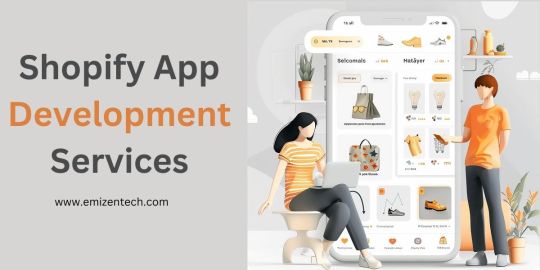
0 notes
Text
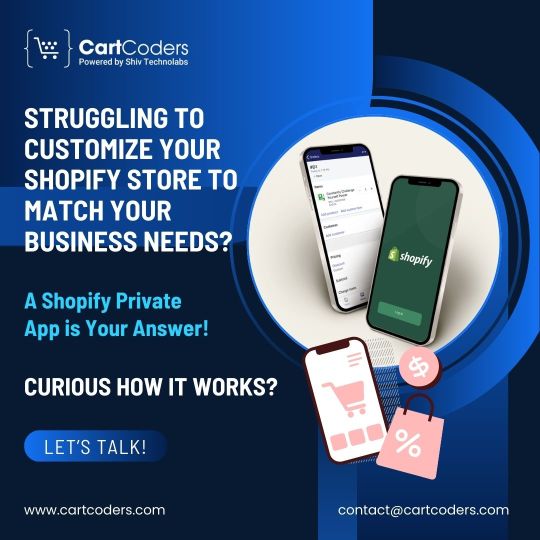
CartCoders offers top-notch Shopify private app development services tailored to meet your unique business requirements. With expertise in custom API integrations, user-friendly interfaces, and robust functionalities, we deliver scalable solutions that enhance store performance.
Our team ensures secure data handling, smooth third-party integrations, and efficient backend operations to help you achieve your eCommerce goals effectively. Trust CartCoders for reliable and efficient Shopify app development.
0 notes
Text
Key Shopify App Ideas in 2024

This blog post presents key Shopify apps that can enhance the performance of your store, from inventory management to advanced marketing automation. These tools not only streamline operations but also fuel growth, enhance customer experiences and offer insights to enable more informed decision-making.
1. Inventory Optimization Apps
Effective inventory management is essential to running a successful Shopify store. This involves streamlining budgets, improving customer service, and optimizing store operations. Inventory optimization apps help reduce holding costs while increasing cash flow - keeping stores agile and responsive to market needs. Shopventory is an innovative inventory management app that integrates seamlessly with multiple Shopify accounts to streamline purchase orders and track inventory.
2. Advanced Marketing Automation Apps
Marketing automation can be an essential tool in driving sales and expanding growth potential. Apps like Klaviyo enable store owners to automate email campaigns, social media posts, SEO optimization efforts and SEO ranking enhancement - making marketing efforts more efficient and effective than ever. Klaviyo even features welcome emails for new visitors as well as abandoned cart notifications and back-in-stock alerts so as to create the ideal shopping experience.
3. Upsell and Cross-Sell Solutions

Upselling and cross-selling are effective strategies for increasing sales while enriching customer experiences. Apps such as Candy Rack and Bold Upsell provide innovative ways to implement these strategies successfully; Candy Rack allows upselling immediately when a customer clicks the 'Add to cart' button, significantly increasing the likelihood of further purchases.
4. Configurable Landing Page Builders
Landing page builders like Shogun and PageFly enable businesses to easily create high-converting landing pages that capture their brand essence while engaging visitors. Shogun provides advanced features like content scheduling, AI-powered SEO tools, built-in analytics with A/B testing as well as A/B testing which help optimize pages for better conversion rates while making marketing efforts data driven.
5. On-Demand Printing and Dropshipping Apps
Management of inventory and logistics can be complex, but on-demand printing and dropshipping apps such as Printful can make this task simpler. Integrating seamlessly with Shopify, Printful offers customizable products without the hassle of managing their logistics or inventory. Printful offers printing and shipping services with consistent quality control, timely delivery, unique options such as sleeve prints, private label branding and white-label packaging.
6. Social Media Integration Tools

Social media integration has become an indispensable strategy for increasing brand recognition and customer engagement in today's digital environment. Integrating Shopify with platforms like Instagram can significantly bolster marketing efforts; its visuals can make products pop off the page while connecting with customers more deeply than ever before.
7. Apps for Fraud Prevention and Security Apps
Trust and security are core components of an enjoyable e-commerce experience, and fraud prevention and security apps provide both merchants and customers with extra protection by blocking fraudulent users and automating chargeback prevention. Apps such as Fraud Filter & IP Blocker use geolocation to block IP addresses known for fraudulent activities while advanced security apps offer features like ID verification, two-factor authentication (2FA), OTP verification through email, SMS or WhatsApp and OTP verification, providing additional proof that transactions remain safe.
8. Subscription Management Apps (Apps)
Subscription-based models are becoming more and more prevalent, and managing subscriptions effectively is critical to customer retention. Apps like Recharge Subscriptions and Bold Subscriptions offer user-friendly interfaces and advanced tools for managing subscriptions effectively - from customizing billing cycles to tracking performance analysis.
9. Applications that Improve Local Shopping Experiences
Catering to the specific needs of local customers is key to increasing customer satisfaction and compliance. Localized shopping experience apps, like Advanced Store Localization, utilize geofencing and geo targeting technologies to tailor product offerings based on the location of customers.
10. Comprehensive Analytics and Reporting Tools
Gaining insights into sales, products, customer behavior, and store performance are essential for making informed business decisions. Shopify store owners can leverage comprehensive analytics and reporting tools like beProfit Reports & Analytics and Data Export IO to optimize customer experience and drive growth.
Conclusion
As we've shown, Shopify apps can make a tremendous difference to the success of an online store. From inventory optimization and marketing automation to fraud prevention and subscription management, these tools cover every aspect of e-commerce to help streamline operations and boost sales. Read the full article
0 notes
Text
0 notes
Text
Top Shopify Private App Development Company by CartCoders
CartCoders is a top Shopify private app development company. We can provide customized solutions to improve your eCommerce store. Our Shopify private app development services are designed to meet the unique needs of your business. Our skilled developers collaborate with you to understand your business requirements, ensuring the final product boosts your store's performance and user experience. We create secure, scalable, and efficient private apps that work perfectly with your Shopify store. Visit our website to know more about how we can support your eCommerce growth.
0 notes
Text
#1 Digital Marketing Company | Dcrayons Consultancy Private Limited
Do you know about how to create a shopify partner account?
Ready to elevate your business? When you join the Shopify Partner Account , you unlock revenue possibilities and tap into a thriving network of Shopify merchants. This straightforward guide will help you kickstart your journey and maximize your Shopify Partner Account.
Joining the shopify partner account – for a successful business
Developing an application for Shopify is enjoyable and easy because Shopify provides numerous applications and resources that users can easily utilize. This guide will cover all of the steps from development environment installation to your app distribution. It has a guide for making an Instagram feed app, with step-by-step instructions. This helps understand the steps discussed.
What is the process of shopify partner account?
Here we are describing some steps of a shopify partner account. some steps of shopify partner accounts.
Step-1: Setting Up Your Shopify Partner Account
The newly launched consultation journey starts from creating a Shopify Partner account. Thus, if you did not have an account, you would have to get one before proceeding with the next steps. Here’s how to do it. Let us discuss some steps.
To open a Shopify account, start by signing up or logging in. Then, visit the official Shopify Partner Program page. If you don’t have an account yet, create one. If you already have an account, just log in.
Navigate to Apps: After logging in to the portal go to the ‘Apps’ tab.
Create a New App: Go to ‘Create App’ and enter app name and URL for the app. This process will create important credentials, such as the API key and secret key-API, that are necessary for your application.
Step 2: Initializing Your Shopify App
Congratulations! You have successfully opened your Shopify Partner Account. Now, it’s time to start your Shopify application. Open your terminal and run the following command:
npm init @shopify/app@latest
This command pulls up your app and creates a shopify.app.toml file. This config file contains details like client id, the name of your application, URL of your application and the scopes needed for the application. Furthermore, you will have to prepare a . file named env and then specify SHOPIFY_API_KEY.
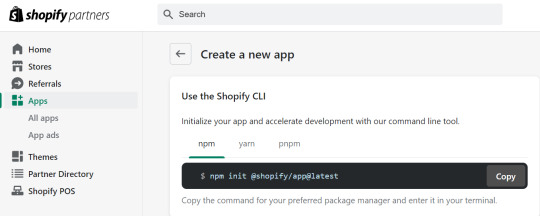
Step 3: Installing Dependencies
To ensure your app has all the necessary dependencies to function correctly, run the following command in your terminal
npm install
This command installs all the packages needed in your application .In this case is React.js for the frontend and Node.js for the backend.
Step 4: Running Your Application
Once all dependencies are installed, you can start your development server by running
npm run dev
Step 5: Building the Frontend and Backend
Again, for our instance, we will be developing the frontend of the app using the help of the React library of JavaScript and the backend with Node. Here’s a brief overview of how to set up both. let describe some steps.
Frontend with React.js
Create React Components: Create React components to be used within your application for headers, footers and other sections of your application.
Navigation Links: As to create different pages, the labels and destinations have to be included in the navigation Link component in App.jsx. That way, you are able to surf from one area of your application to the other.
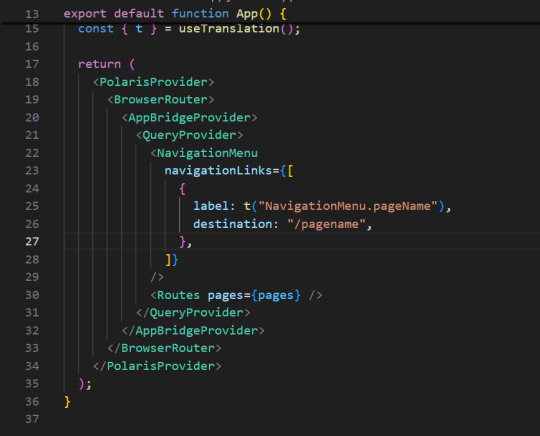
Backend with Node.js
Set Up Express Server: Please use express Js to set up your server and control the backend procedures.
API Routes: Define API routes which will handle the request and response between the front end and the back end.
Practical Example: Instagram Feed App…
Let’s apply the above steps to create a practical example: an application that is used in feeding the user’s Instagram account. This application will let the users login through the Instagram account, pull the media, and then the media can be showcased in a grid or slider view.
Main Functionality
The landing page of the app features a button which says “Connect to Instagram.” When the users tap on this button, they are transferred to the Instagram login page. If the login is complete, the app will retrieve pictures and videos from their Instagram profile and provide it in slider or grid view.
Authentication and Authorization
We use an authentication URL containing the following parameters: In this method, the parameters included are client Id, redirect Uri, scope, response Type, and auth Url. This URL corresponds to the redirection to Instagram’s login page. Once a user logs in, Instagram gives an authorization ID and using this ID, an access token is given by our back end..

Here is how the process works in detail.
Auth URL: Create an auth URL with the necessary parameters.
Redirect and authorization: Redirect users to Instagram’s login page. Once successfully logged in, get a license ID.
Access token request: To request an access token from the backend, use an authorization ID with client id, client secret, grant type, and redirect uri.
Introducing news reports and displaying content
Once we have the access token, we can then retrieve all the media id from the user’s Instagram profile. We use these media id to retrieve the URLs of the images and videos. These media items are then displayed in our app, which has various styling options.
Here is a detailed analysis of this phenomenon.
Retrieve Media IDs : Use an access token to retrieve media IDs from the Instagram API.
Accept media URLs : Assign a corresponding media URL (image or video) for each media ID.
Display Media: Use React components to display media objects in a grid or slider format.
Optimizing the Instagram feed
One of the main features of our app is that we can customize the Instagram feed. Here are some options to change.
Width: Adjusts the spacing between images.
Rounded corners: Apply rounded corners to images.
Viewable posts: Check how many posts can be viewed at one time.
These CSS and React state settings can be used to update the layout dynamically based on the user’s preferences.
Deploying Your Shopify App
Once your app is fully developed and tested, you can deploy it to any store created in Shopify. Here’s a brief overview of the deployment process:
Build Your App: Run the build command to prepare your app for production.
Upload to Shopify: Use the Shopify CLI or Partner Dashboard to upload your app to the Shopify store.
Submit for Review: If you intend to publish your app on the Shopify App Store, submit it for review to ensure it meets Shopify’s standards and guidelines.
How to Maximize Your Shopify Partner account?
Promote your services: Use the Shopify Partner Dashboard to promote your design services, apps or themes. Emphasize what makes your offers unique and how they benefit Shopify merchants.
Use Shopify’s resources: Take advantage of the training materials and support provided. These resources will help you stay up to date with Shopify’s latest features and best practices.
Connect with the community: Join the Shopify forums and partner communities to connect with other professionals. Sharing knowledge and learning from others can help you improve your services and grow your business.
Track Your Performance: Monitor your earning potential and performance with the Affiliate Dashboard. This will help you understand what is working and where you can make improvements..
Conclusion
Creating a Shopify app involves several key steps, from setting up your development environment to deploying your app. By following this comprehensive guide, you can create a functional and customizable app to meet various needs. Our example of an Instagram feed app demonstrates how you can integrate third-party services and enhance your app’s functionality, offering users a dynamic and engaging experience. Whether you’re a seasoned developer or just starting, Shopify provides the tools and resources to help you succeed
0 notes
Text
Unlocking FedEx Home Delivery: An In-Depth Guide for WooCommerce & Shopify Users
Efficient shipping solutions are vital for e-commerce success, with FedEx Home Delivery standing out for residential deliveries in the US. For WooCommerce and Shopify users, understanding FedEx Home Delivery surcharges is crucial. This guide explores the nuances of these surcharges, comparing residential and commercial rates, and offers actionable insights for merchants.
Understanding FedEx Home Delivery Surcharge: FedEx Home Delivery relies on FedEx Ground’s infrastructure but varies significantly in cost, especially for residential deliveries.
Why Use FedEx Home Delivery?
It’s ideal for shipping heavier items to residential addresses without commercial amenities. Despite higher surcharges, it’s cost-effective for specific customer demographics.
Comparing Costs: FedEx Express and FedEx Ground have raised commercial surcharges, while FedEx Home Delivery’s residential surcharge stands at $3.80 per package.
Identifying Residential Addresses: Residential surcharges apply to shipments to homes or private residences within the US.
Integration with WooCommerce & Shopify: Choose plugins or apps that accurately calculate shipping costs, including residential surcharges.
Optimizing Shipping: Batch processing, address verification, and negotiating rates can mitigate surcharge impacts.
By following this comprehensive guide, WooCommerce and Shopify users can unlock the full potential of FedEx Home Delivery, empowering them to deliver exceptional service and exceed customer expectations in their online ventures.
Conclusion: Grasping the nuances of FedEx Home Delivery surcharges is paramount for streamlined e-commerce operations.
0 notes
Text
Most Popular Platforms for Website Development

In modern day virtual age, having an internet presence is vital for corporations, entrepreneurs, and creatives alike. Whether you are looking to start a private weblog, an e-commerce keep, or a professional portfolio, choosing the proper internet site development platform could make all the distinction. With such a lot of options available, it could be overwhelming to determine which one is pleasant on your needs. To help you out, we've compiled a list of the top website improvement structures that cater to numerous requirements and skill tiers.
1. WordPress
Overview:
WordPress is one of the maximum famous internet site development platforms, powering over 40% of all websites on the net. It's an open-source content management device (CMS) that gives flexibility, scalability, and a great array of plugins and topics.
Key Features:
User-Friendly: Ideal for beginners with its intuitive dashboard.
Customizable: Thousands of topics and plugins to enhance capability.
Search engine marketing-Friendly: Built-in SEO tools and plugins like Yoast search engine optimization.
Community Support: Extensive network boards and sources.
Best For:
Blogs
Business websites
E-trade stores (with WooCommerce)
2. Wix
Overview:
Wix is a cloud-primarily based internet site builder known for its drag-and-drop interface, making it clean for absolutely everyone to create a website without any coding information. It gives a extensive variety of templates and a robust app market.
Key Features:
Ease of Use: Drag-and-drop builder for short web page introduction.
Mobile Optimization: All templates are cell-pleasant.
App Market: Extend functionality with numerous apps and integrations.
Free Plan: Get commenced without any upfront value.
Best For:
Small agencies
Personal websites
Portfolios
3. Squarespace
Overview:
Squarespace is a website development platform that emphasizes layout and aesthetics. It's recognised for its beautifully crafted templates and is famous among designers, photographers, and artists.
Key Features:
Elegant Templates: High-exceptional, professional designs.
Built-In Features: E-trade, blogging, and SEO tools.
Responsive Design: All templates are optimized for mobile gadgets.
24/7 Customer Support: Reliable assist for customers.
Best For:
Portfolios
Creative specialists
Small to medium-sized groups
4. Shopify
Overview:
Shopify is a devoted e-commerce platform that simplifies the procedure of creating and dealing with on line stores. It gives powerful tools and integrations to assist groups sell products on-line efficaciously.
Key Features:
E-Commerce Focused: Comprehensive tools for managing merchandise, orders, and payments.
App Store: Wide variety of apps to extend save capability.
Payment Gateway Integration: Supports a couple of payment options.
Scalable: Suitable for small to big corporations.
Best For:
E-commerce agencies
Dropshipping stores
Retailers
5. Weebly
Overview:
Weebly is another person-pleasant website builder that gives a easy drag-and-drop interface. It's specially suitable for the ones seeking to create a internet site quickly and with minimum attempt.
Key Features:
Drag-and-Drop Builder: Easy to use, no coding required.
Integrated E-Commerce: Built-in tools for online promoting.
Search engine marketing Tools: Basic SEO capabilities to enhance search engine scores.
Mobile App: Manage your website online at the pass.
Best For:
Personal web sites
Small organizations
Event websites
6. Joomla
Overview:
Joomla is an open-supply CMS that gives a stability between person-friendliness and versatility. It's appropriate for greater complicated websites and has a sturdy developer network.
Key Features:
Extensibility: Thousands of extensions and templates.
Multilingual Support: Built-in support for a couple of languages.
User Management: Advanced consumer control and get right of entry to manage.
Search engine marketing Friendly: Powerful search engine optimization gear and extensions.
Best For:
Community websites
E-trade websites
Large corporate websites
7. Drupal
Overview:
Drupal is a powerful open-supply CMS used for constructing complicated and notably customizable web sites. It's preferred by means of developers for its flexibility and scalability.
Key Features:
Highly Customizable: Ideal for complex and big-scale tasks.
Robust Security: Advanced safety capabilities and regular updates.
Scalable: Can take care of excessive visitors and huge quantities of content.
Developer Friendly: Extensive API aid and customization alternatives.
Best For:
Government websites
Educational institutions
Large businesses
Conclusion
Choosing the right internet site improvement platform depends on your specific desires, finances, and level of information. WordPress and Wix are awesome for novices, while Shopify is the go-to for e-trade businesses. Squarespace gives lovely designs for creatives, and Joomla and Drupal offer powerful equipment for complicated web sites. Evaluate your requirements and choose the platform that great aligns with your goals to create a a hit on-line presence.
0 notes